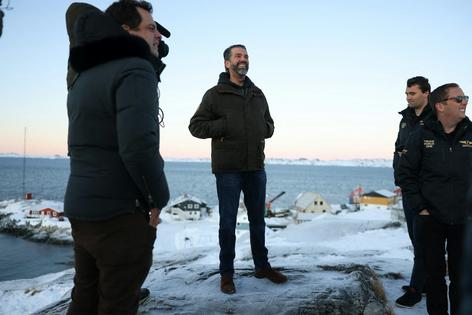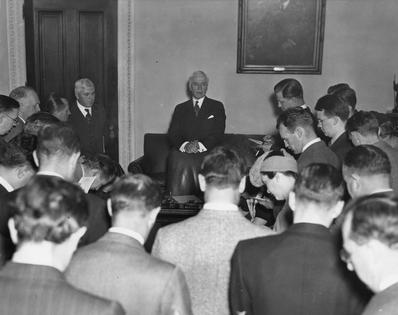In eyeing Greenland, Trump is echoing long-held American designs on the Arctic expanse
Published in Political News
At a news conference in early January 2025, President-elect Donald Trump rambled through a grab bag of grievances and proposals, including his disdain for wind power and low-flow showerheads and his thoughts on the possible acquisition of the Panama Canal, Canada and Greenland.
On the latter, he mused, “People really don’t even know if Denmark has any legal right to it, but if they do, they should give it up, because we need it for national security.”
The negative commentary in prominent news outlets was swift. Such “vague threats” and “messianic promises” were “shocking … in their craziness,” a harbinger of a “chaotic and stream-of-consciousness presidency, a succession of opinion writers suggested.
Yet, with respect to Greenland, Trump’s proposal has a long history. Here, he is guilty less of territorial ambitions than of saying the quiet part out loud.
In 1823, President James Monroe established the principle that European powers were to defer to the United States on matters pertaining to the Western Hemisphere. While what came to be called the Monroe Doctrine and its corollaries were employed primarily to assert American interests and ambitions in Latin America, they clearly applied to northern neighbors as well.
After the German invasion of Denmark in April 1940, Secretary of State Cordell Hull made this point clear to his Danish counterpart, asserting that "Greenland is within the area embraced by the Monroe Doctrine.”
The two countries signed a “Defense of Greenland” agreement in 1941 that allowed the U.S to “construct, maintain, and operate … landing fields, seaplane facilities, and radio and meteorological installations.” The U.S. pressed to retain its bases after the war, a decision that was formalized by treaty in 1951.
Read more:
For the U.S., which had a substantial military presence in Greenland by the early 1950s, the territory was crucial as an outpost for the Air Force and as a link in the so-called Distant Early Warning Line that monitored possible Soviet incursions from the north.
In early 1955, almost 70 years to the day before Trump’s recent speech, the Joint Chiefs of Staff proposed a more radical solution to preservation of American interests in the North Atlantic. In a memorandum for the secretary of defense, titled “Possible Acquisition of Greenland by the United States,” the military leaders reiterated the U.S. position: “Geographically, Greenland is part of the Western Hemisphere and has long been regarded so by the United States.”
“As to whether it would be to the military advantage of the United States to acquire title to Greenland,” the memorandum continued, “the Joint Chiefs of Staff believe it to be axiomatic that sovereignty provides the firmest basis of assuring that a territory and its resources will be available for military use when needed. United States sovereignty over Greenland would remove any doubt as to the unconditional availability of bases.”
A few days later, a shorter version landed on President Dwight Eisenhower’s desk, with the summary assessment that “it would be to our military advantage to acquire title to Greenland from a military viewpoint.”
Such musings, in 1955 or 2025, casually assume the universality of American interests and disregard the sovereignty of allies. By the same token, Trump’s proposal is evidently not just another of his frequently outlandish ambitions, when it has been a fixture of U.S. national security for over 70 years.
This article is republished from The Conversation, a nonprofit, independent news organization bringing you facts and trustworthy analysis to help you make sense of our complex world. It was written by: Colin Gordon, University of Iowa
Read more:
4 reasons why the US might want to buy Greenland – if it were for sale, which it isn’t
Trump’s push to control Greenland echoes US purchase of Alaska from Russia in 1867
50 years ago, a US military jet crashed in Greenland – with 4 nuclear bombs on board
Colin Gordon receives funding from the National Endowment for the Humanities, the Mellon Foundation, and the Russell Sage Foundation.
































































Comments